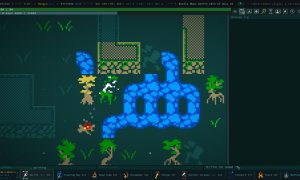 As far as Warhammer 40k goes, I suppose I’m something of a heretic. I’ve played Dawn of War 1 and 2, picked up all the expansions, and I’ve loved just about every moment of the gameplay… and yet, I’ve never played the actual table-top or board games that the series sprung from. In fact, I’ve never even read a Warhammer 40k book. So when I heard that Space Hulk was coming to Steam, I was pretty excited to try a Warhammer 40k title that was, if not based on the ‘real’ tabletop game, at least based on what sounded like a pretty noteworthy board game in its own right. Would I enjoy it as much as I did the realtime strategy titles? Would it just feel like a flop, despite being closer to a ‘traditional’ Warhammer game? I was excited to find out either way. What I discovered in Space Hulk was a game that had a fantastic mood and setting to it, a glorious interface, and a unique turn-based tactical title that nevertheless failed to deliver enough content to justify its retail price.
As far as Warhammer 40k goes, I suppose I’m something of a heretic. I’ve played Dawn of War 1 and 2, picked up all the expansions, and I’ve loved just about every moment of the gameplay… and yet, I’ve never played the actual table-top or board games that the series sprung from. In fact, I’ve never even read a Warhammer 40k book. So when I heard that Space Hulk was coming to Steam, I was pretty excited to try a Warhammer 40k title that was, if not based on the ‘real’ tabletop game, at least based on what sounded like a pretty noteworthy board game in its own right. Would I enjoy it as much as I did the realtime strategy titles? Would it just feel like a flop, despite being closer to a ‘traditional’ Warhammer game? I was excited to find out either way. What I discovered in Space Hulk was a game that had a fantastic mood and setting to it, a glorious interface, and a unique turn-based tactical title that nevertheless failed to deliver enough content to justify its retail price.
The storyline of Space Hulk is straightforward. You control the space marines of the Blood Angel chapter as they struggle to deal with an infestation of genestealers on a colossal, derelict space ship – the titular Space Hulk. These genestealers – freakish looking aliens with a black glossy appearance – are ferocious threats, capable of slaughtering practically whatever happens to get within melee range of them, space marines included. Your task is to deal with the genestealer threat over a variety of levels, sending your space marines out to finish mandatory objectives, all while dealing with the genestealers as they spawn from the shadows to try their best to slaughter your team. Lore and dialogue is interspersed between each of the levels, keeping you up to pace on the storyline after each of your successes – but during the actual game itself, you’ve got nothing but pure unadultered tactical turn-based conflict to think about.
Given my utter inexperience with anything Warhammer 40k related that doesn’t take place on a computer screen, I wasn’t sure what to expect out of Space Hulk. And I don’t just mean I was approaching this game unsure of whether I’d enjoy a quasi board game style experience or not – I was legitimately worried I wouldn’t even understand what was going on. Have you ever seen a tabletop game manual before? Those things can get complicated! Thankfully, the game immediately gives you the option to play through a helpful tutorial where all the pertinent rules and systems are explained, and it turns out instructions are a lot more fun to absorb if they’re accompanied by a whole lot of explosions and bullets. This is a little like X-com “lite” in a way: turn-based tactical gameplay revolving around moving all of your characters during ‘your’ turn, then letting the opponent move all of their characters – and so it continues until you fail or achieve the mission objectives. There’s no between-level research or experience-point-spending to speak of in Space Hulk – it’s just one challenge after the other, though multiple difficulty levels are available.[singlepic id=15757 w=320 h=240 float=right]
The presentation of Space Hulk is absolutely phenomenal. You’d think that the nature of the game would make it a bit dry, but Full Control Studios really crafted a gorgeous, engaging interface for the game. Space marines don’t just move from point A to point B – you get to look through their eyes as they move, complete with an on-screen display of their perspective, bobbing along as they take their steps. If a genestealer is within their line of sight, they’ll appear to the marine as well as on the ‘map’ itself. This game features a kind of halfway point between a fog-of-war and non-fog system – you’ll get ‘blips’ on the screen where you’ll know some amount of genestealers generally are, but you won’t really have accurate information about how many are present until you actually see them, and seeing them requires your teammates to be facing in the appropriate direction. Once a genestealer is seen, however, dispatching them isn’t so difficult – assuming you have enough energy left to open fire and take them out. That’s the core mechanic of Space Hulk at work: coordinating a team largely made up of ranged units, going up against melee units that have a good chance of slaughtering you if you get close. You’ll cope with this by carefully arranging your team to keep an eye on choke points, spending points on ‘overwatch’ mode (which lets your unit automatically open fire if a genestealer moves within their line of sight during the genestealer’s turn), lighting up hallways with deadly flames, and more.
If Space Hulk was being rated on attention to detail alone, it would automatically be a must-buy game for any turn-based tactical game fan. The voices of the units as they’re selected, the interface’s details, the first-person HUD display for the units… all of these things enhance Space Hulk tremendously. The gameplay itself is a pleasure too, intense enough to almost feel like a puzzle game as you advance through the campaign. One complaint some players may have about Space Hulk is the relatively punishing feel of failure. It doesn’t take much to make a level go sour, and I found myself starting from square one over and over again – and the fact that this can result from a bad roll of the dice may frustrate some. For my part, I just found it fascinating enough to find the whole thing more enjoyable, even curious, than anything else. The feel that you get when you finally manage to clear one of these levels is damn pleasant – and another thing Space Hulk has in common with puzzle games is that you’ll momentarily feel pretty smart if you finish a level objective. Smart or lucky. There’s not a huge number of units to play around with, but the ones you get feel different from each other, and their differences certainly impact how you play them on the board – the heavy flamer works great for when you desperately need to make a certain passageway impossible for genestealers to get through, while a power sword works great for when you need a passageway defended and you know you likely won’t be able to keep the genestealers at a distance. There are 2 kinds of enemies to face (genestealers and broodlords) and 3 kinds of units to control (terminators, sergeants, and librarians), the latter of which can bring 10 different kinds of weapons over the course of the campaign.[singlepic id=15752 w=320 h=240 float=left]
Along with the gameplay meat, there are some additional options rounding out Space Hulk. Achievements are featured, for those of you who enjoy getting in some completionist action. You can also edit your personal banner for your space marines – unlocking various borders and designs throughout the campaign. I admit, this feature is one I’ve seen before, and I never really appreciate it as much as others seem to – it’s clearly something made with the more hardcore fans in mind. Online multiplayer is also available, as well as a hotseat mode – I suppose for people who want to get in some board game action but don’t feel like dealing with the mess of actually having the dice and figures and such out on a table. In-game documentation in the ‘librarium’ is also featured for players who want to reacquaint themselves with some of the rule specifics without having to go through the tutorial all over again – a nice touch.
If there’s any complaint I would make about Space Hulk, it’s that – as nice and as supremely polished as it is – the entire affair just feels a bit on the short side. While the missions are difficult, they’re not very numerous – 12 total, not counting the tutorial. Sure, there’s an added difficulty mode – and considering how hard the game seems on normal, I can only imagine the lengthy mix of fun and frustration that would offer – but nevertheless, 12 missions seems thin. There’s no support for modding at the moment either (and none seems to be planned), so any thoughts of creating your own Space Hulk maps are currently a pipe dream, at least in this iteration of the game. There are some other glitches that pop up from time to time during gameplay – mostly forgivable graphical gaffes – but it’s the lack of content that really keeps this from being a top notch game.[singlepic id=15754 w=320 h=240 float=right]
It’s a shame, really, because – lack of content and modest bug issues aside – Space Hulk really is a great game. Full Control has taken a board game and brought it to the PC, staying true to the source material all while breathing considerable life into the actual gameplay experience itself. With a bit more time, and much more content, I’d be recommending this one to any turn-based tactics fan straightaway. As it stands, unless you’re a big Space Hulk or Warhammer 40k fan, I’d suggest keeping an eye on this one until it hits a nicely discounted price during a Steam Sale, and then snapping it up. At a discounted price, the lack of content wouldn’t stand out nearly as much – and in the meantime, it just opens up opportunities for the devs to smooth out whatever minor glitches the game currently is currently marred by.
Victor Grunn has been a gamer since the days of single-button joysticks and the Atari 800XL. When not lamenting the loss of the Ultima series or setting people on fire in Team Fortress 2, he's an aspiring indie game developer and freelance writer.

See below for our list of partners and affiliates:

























